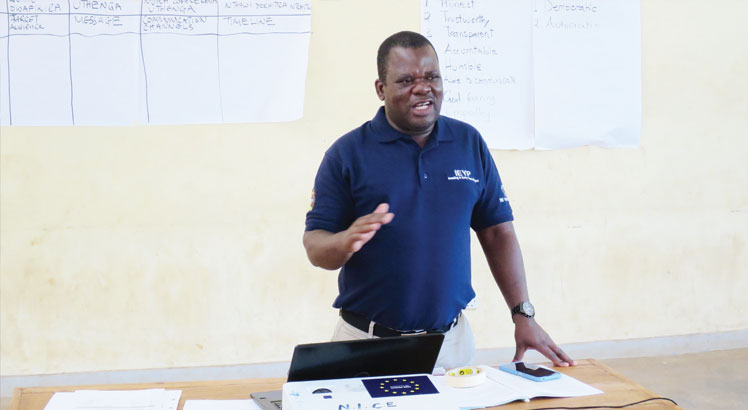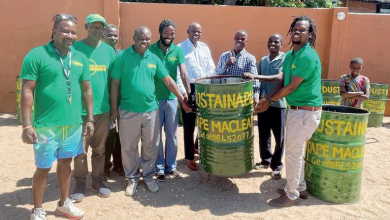Empowering women to assume political positions
As farmers await heavens to give them good rains for a bumper harvest next year; after toiling in vain last year due to dry spells, some women in Neno are seeking God’s divine intervention to usher them into political leadership positions.
They want to occupy influential positions to bail out their fellow women from a myriad of nightmares engulfing Neno district.
The women argue that they have been frustrated by men who have been steering the political wheel for a long time. Their aim is to reconfigure the power dynamics of this underdeveloped district.
For years, Neno has been struggling with a litany of issues. Basic infrastructure such as roads and clean water supplies are virtually non-existent, while healthcare facilities remain inadequate, forcing residents to travel long distances to access them, yet it is their basic right.

Women l ike Chandi c e Mamlangeni Chimphonda and Lignet Thupilifana are stepping forward, determined to lead the charge for change, challenging the deeply-entrenched male-dominated political system.
At the forefront of this movement is the 43-year-old Chimphonda, an entrepreneur who is committed to bringing the much-needed development in Neno by contesting as a Member of Parliament (MP) for Neno East constituency in the 2025 General Elections.
She promises to transform lives of the constituents by bringing them potable water and health centres nearby, and access to farm inputs to help farmers harvest bumper yields.
“I am a bona fide citizen of this district, in particular my area. I know people’s needs. I want to take advantage of this background knowledge to change things,” says the soft-spoken woman.
“There is no access to potable water and the road network is still very poor,” she states, recalling her experiences of fetching water from the Shire River as a child.
“It pricks me to the marrow to see this still happening. In this era, we can’t still rely on untreated water from Shire River. I mean in this era, we cannot be sharing a water source with animals,” stresses Chimphonda.
She says her priority will be to ensure that she brings piped water to the residents to rescue them from cholera and waterborne diseases which are rife in the district.
“I am also focusing on improving healthcare and infrastructure in my area to arrest maternal and neonatal deaths,” adds Chimphonda.
She recalls a time when she had to walk about 20 kilometres to the nearest health centre (Lisungwi), a journey that many Neno residents still make today.
“We have to develop a proper transportation network to connect our communities,” she says.
Joining Chimphonda in the push for change is 35-year-old Thupilifana, one of the shadow councillors for Chilim’bondo Ward in Neno North constituency.
Like Chimphonda, Thupilifana is focused on solving the district’s chronic water problems.
“Many lives are at stake,” says Thupilifana, emphasising the urgency of the situation.
For her, the lack of development in Neno is not just due to limited resources, but also to failure by men in leadership to prioritise the community’s needs.
She believes that women, who often bear the brunt of these hardships, are better-equipped to understand and solve them.
“Once men are voted into power, they don’t think about transforming the area,” observes Thupilifana, echoing the frustrations of many Neno residents.
She sees her candidacy as an opportunity to bring practical, long-term solutions to the district’s problems.
But despite their determination, both Chimphonda and Thupilifana face significant challenges in their journey to leadership.
In Neno, as in many parts of Malawi, deep-rooted cultural norms have long kept women out of politics.
Traditionally, women have been confined to domestic roles, while political leadership has been seen as the domain of men.
Society has taken the limited women political participation as normal and in tandem with accepted traditional norms.
Yet globally, and domestically, there has been a discourse and agenda on promoting women participation in decision-making positions.
The Beijing Platform for Action (from 4th World Conference on Women, Beijing 1995) prioritised women to take full participation in decision-making and leadership.
The 2030 Agenda for Sustainable Development Goal (SDG) underscored the need and urgency to achieve gender parity in leadership through SDG Target 5.5, necessitating women’s participation at all levels of decision-making positions.
Convention on the Elimination of Discrimination Against Women (Cedaw) explicitly mentions women’s political equality (Articles 7-9) and discusses women’s equal participation at all levels (Article 7b).
And locally, the Gender Equality Act aims at promoting gender equality, equal integration, influence, empowerment, dignity and opportunities, for men and women in all functions of society, etc.
These commitments collectively express that women’s right to equality cannot be reached without equality in political decision-making positions and they require mind-set change.
It is against this background that the National Initiative for Civic Education (Nice) Public Trust in collaboration with the Centre for Civil Society Strengthening (CCSS) last Friday engaged 20 women who have shown an interest in the district to contest for next year’s elections in both the Local and National Assembly.
The training, which drew 20 women aspirants across the district was organised to equip them with knowledge and skills in leadership, build their confidence on public speaking and how to market themselves to eligible voters, among other topics.
This is under Nthawi Yawo project Nice and CCSS are implementing in the district alongside Salima and Karonga districts with funding from United Nations Development Programme (UNDP) aimed at enhancing the participation of women in the 2025 Malawi General Elections.
Nice Trust civic education programmes officer, Christopher Naphiyo says it remains their commitment to implement various interventions that address problems that impede women from taking part in political space.
“This is the reason we organised this training to empower the women with leadership, campaign management, public speaking skills, policy development, among others,” he said.
Naphiyo believed the training equipped the women with the requisite skills and knowledge to run successful political campaigns.
“Under this project, we want to build women’s confidence and foster a sense of entitlement to leadership roles.
“We are happy to note that the impact of this empowerment initiative is already being felt in Neno where perceptions on female leadership are beginning to shift,” he boasts.
The district’s director of planning and development, Charles Lomoni, praises the initiative by Nice and CCSS for empowering women on governance issues.
“This project will go a long way in ensuring that women in Neno are empowered on matters of governance,” says Lomoni.
He revealed that the council is implementing a number of interventions aimed at empowering women to assume leadership positions, hence, the training goes in sync with their plans.
“We salute Nice for empowering our women through the training,” stresses Lomoni





